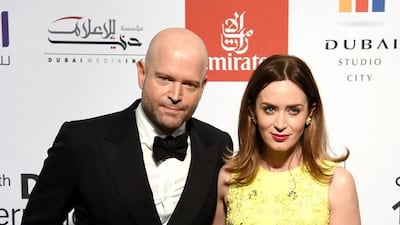The next time you're watching a big, boombastic Hollywood blockbuster, spare a thought for the director. It my well be the toughest film he's ever made, says Monster's Ball and Quantum of Solace director Marc Forster.
“When you look at these big, tent-pole Hollywood blockbusters you sometimes think ‘that’s not hard to make - you’re just making movies for the lowest common denominator, for pure entertainment’. It’s only once you make one of those movies yourself that you realise those ones are actually the hardest ones to make,” says Forster.
“When you’re making these smaller dramas, you’re doing it for a small audience that you already know enjoys those kind of movies, and they’re very intimate stories, and that’s great. But if you’re making this big monster movie for an incredibly large audience, it’s much harder to try to make subtlety and storytelling not obvious and cliched, but you still somehow have to hit all the right buttons for a huge number of people.”
Forster, who has been in Dubai as part of the judging panel for the IWC Filmmaker Award on Thursday, December 11, is well-qualified to comment. His own body of work stretches from the complex fiction of 2001's Monster's Ball, which brought Halle Berry the Oscar for Best Actress in 2001, to the idiosynchratic biography-meets-period drama-meets-play-within-a-play-fantasy of seven-time Oscar nominated Finding Neverland to the all-guns-blazing action of Bond number 22, Quantum of Solace, and passes through the critically-lauded, and again Oscar-nominated, Dari-language adaptation of Khaled Hosseini's The Kite Runner, just to keep any vague sense of predictability at bay.
"I've always been interested in different genres, and I like to think every film I've made has been different to the one before. The thing that ties them all together is the strength of the story, and I go for the scripts I think I can make the best story with. With something like The Kite Runner, there was a novel that really spoke to me and demanded turning into a film. I really wanted make a film that truly honours the book and respects the culture, because I'm not from there and wanted to make sure the details were captured and that the emotional complexity of the characters would be right.
“Other times, though, you can read a book and think ‘that’s all there already. It doesn’t need making into a film’. It’s like it’s already finished, it really is down to each individual case.”
While Forster doesn’t have a film screening at this year’s festival, his commitment to story helped with his work on the judging panel for the IWC award, which gives US$100,000 (Dh367,000) to a Gulf filmmaker each year to help with the development of the winning script.
"I've obviously read all the scripts for this year's awards, and I've been really impressed," he says. "There's a real depth to them. They take me back to some of the classic days of Italian cinema, they bring to mind films like The Bicycle Thief, you know? Real story tellers films. We don't see enough of that sometimes."
Forster is also full of praise for IWC’s work with DIFF, and its other film-related projects around the world: “I first became involved with IWC in 2009, and I can say they are real, genuine cinema lovers. They really do believe in their work to support cinema and help young film makers out wherever they can.”
When your CV already includes an Oscar for your only your second film, rebooting one of cinemas most-loved and successful franchises into the current, darker, Daniel Craig-era Bond, and more recently directing the highest-grossing zombie movie ever in the form of World War Z, it must be hard to know how to go one better, but Forster is confident he has plenty more to say: "As a film maker I just keep growing and learning, and there are so many things still to explore. I'm always trying to grow as a story teller, and there's still so many stories to tell and so much more exciting stuff I want to do in my life. I really do feel like I just started to make movies."
Next up for Forster should be the forthcoming adaptation of Pierce Brown's Mars-set novel Red Rising. The film rights for the novel were subject to a seven-figure bidding war between Hollywood studios, won by Universal in February. For now, there's no scheduled release date as, unsurprisingly, Forster wants to do everything right.
“We’re still developing the script right now,” he says. “It really does take time with these huge movies, I can’t emphasise that enough The story has to be absolutely perfect, and I really want to get that right before anything else.”
cnewbould@thenational.ae

